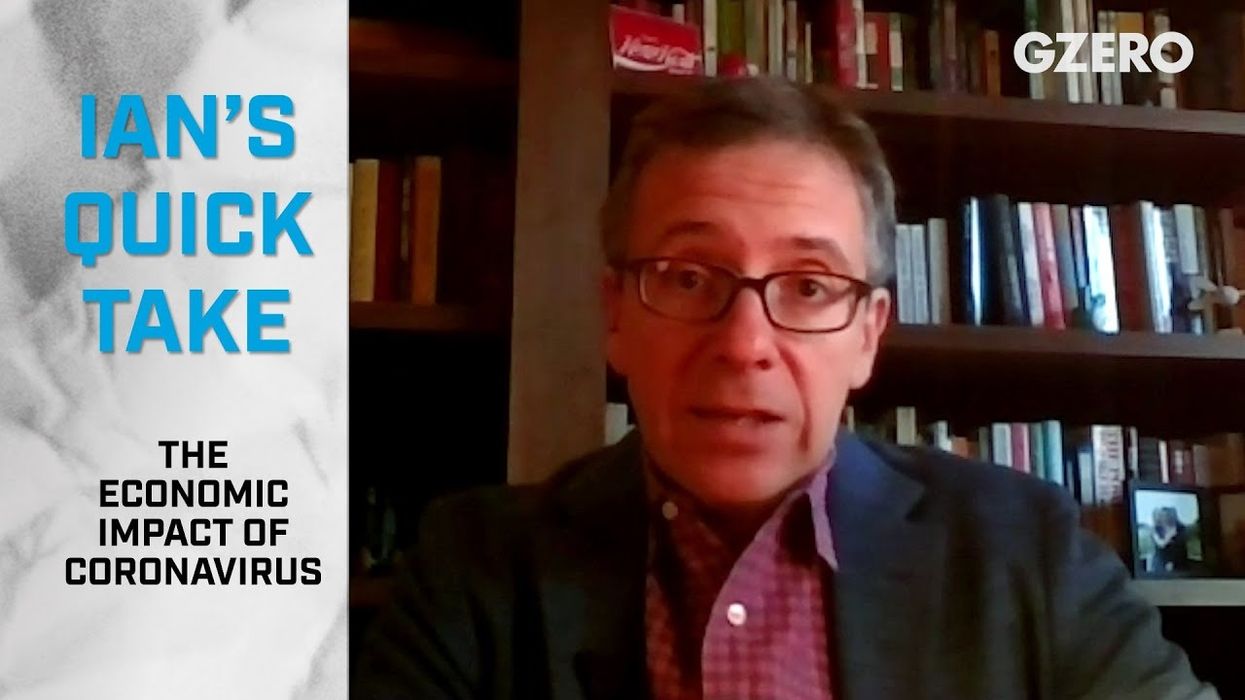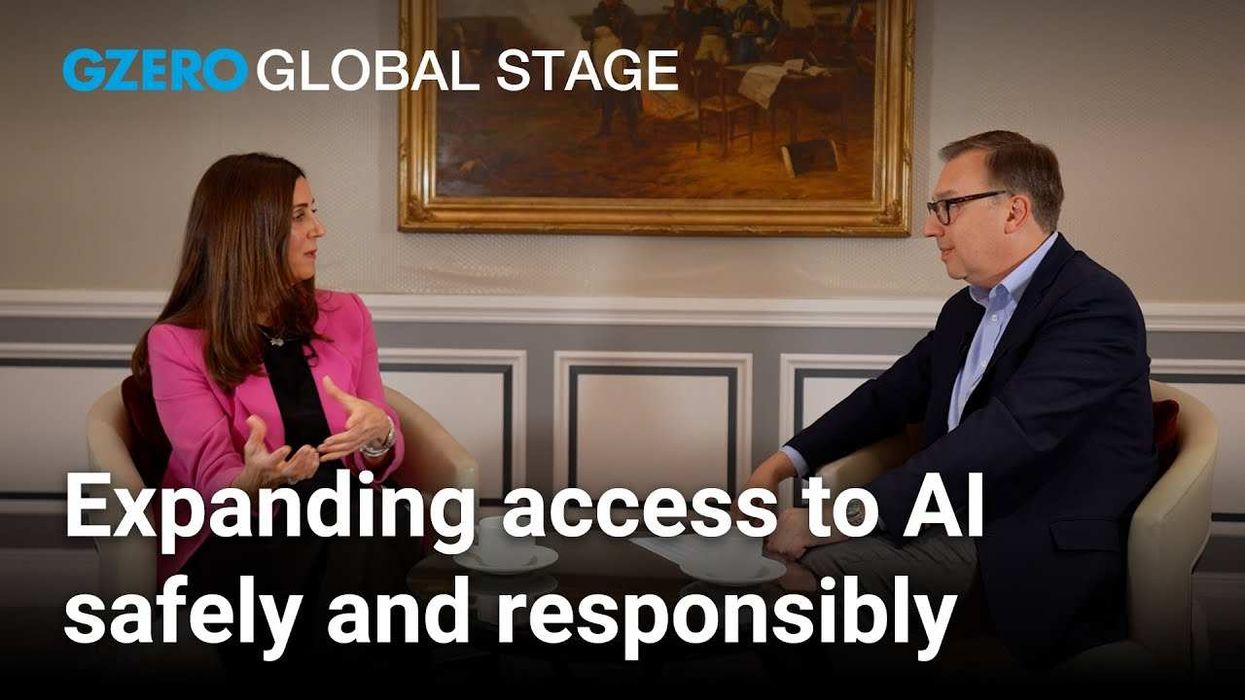VIDEOSGZERO World with Ian BremmerQuick TakePUPPET REGIMEIan ExplainsGZERO ReportsAsk IanGlobal Stage
Site Navigation
Search
Human content,
AI powered search.
Latest Stories
Start your day right!
Get latest updates and insights delivered to your inbox.
Differences in strong unified national response, vs not: In Japan, everyone listened to the government. If they say wear a mask, everyone wears a mask. If they say engage in social distancing, everyone engages in social distancing. In South Korea, too - enables effective response.
In the US or Italy, there's much more individualism, irrespective of liking government. In Italy, mayors are pleading and shouting obscenities at citizens because they're not listening. Authority doesn't matter. In France, too. Contrast in Germany, strong support for the German government; in Western countries, one of the best response functions we've seen.
A reason you need consistent shutdown early: avoid overwhelming the health care system. If people can't get needed intensive care, fatality rates around coronavirus go up 5 - 10 times. There are knock on implications of a health care system not functioning: cross infection. People with chronic and severe conditions unrelated to coronavirus unable access critical medical care. That has knock on effects on the economy. You need to surge on available tests and ability to test, before discussing when to open up the economy.
Good news, this is a top priority in the developed world; surging on test capabilities, masks, ventilators is moving fast. US companies like Roche making hundreds of thousands of test kits per week, will get us to a place that medical systems will not. We'll be in a position not to be overwhelmed, probably within a month in many localities. There's danger that systems get overwhelmed before then - possibility in New York and other municipalities in the next 2 - 4 weeks. That's the biggest danger zone for the US. Parts of Europe, e.g., Spain. Possibly Paris.
In emerging markets, bigger problems: bad, late governance. In Mexico, in Brazil, leaders refuse to accept reality, providing fake news to their people. Not like Trump exaggerating when a cure might come or suggesting medicines could help to respond, that lead to a run on those medicines. Even with Trump's press conferences, which have replaced his rallies, you're getting real news from Pence, the surgeon general, the NIH, Tony Fauci. In the US, general information around the crisis is not great, but it's not godawful. In Mexico, in Brazil, in certain emerging markets, people are getting fake news. That it's not really a danger. It's not really a crisis. You can't get it. Don't worry. Act normally. Disaster for countries that can least afford a failed response.
Lack of coordination globally makes it harder to address crisis. If you can shut down borders effectively, doesn't matter as much. The economic hit is much greater. Restarting supply chain in China. In Malaysia, supply chain is shut down for a minimum of two weeks - going to be longer. Malaysia has a lot of components of electronic goods. Supply chain across Asia, rolling hits. True in Latin America. No global response, nor an equal global rollout of this crisis.
It takes time to restart the economy. Laid off workers won't be immediately available. Restaurants needs to hire, integrate. That's the case with many different components of our interconnected economy. Supply chain & labor disruptions, people that are ill, all make it harder to get the economy going.
Second quarter will be the worst quarter we will have experienced in our lifetimes. Third quarter will be bad. That implies that we're in a heavy recession right now. Potential for further outbreaks forcing a 2nd round of economic closures is significant. That would be the worst economic and market outcome for this crisis. Despite the political pressure to get markets open and get the economy open again - if you have to shut down the economy again and reestablish quarantine, confidence will be shot.
People aren't suddenly going to feel comfortable going to restaurants, malls. It's going to take time to get back up to speed. Even with strong stimulus, 2 trillion dollars in the US (could be bigger than that). Congress goes away, a lot of them already have tested positive for coronavirus or are under self-quarantine. Getting them back together to negotiate a new bill is probably a minimum of 4 weeks away. If we get major market crashes in the interim, don't look to Congress for help. That is an issue.
Keep reading...Show less
More from Quick Take
Zelensky, Trump, and NATO: A united front on Ukraine?
August 18, 2025
Trump and Putin to meet in Alaska to discuss Ukraine
August 11, 2025
US government rescinds West Point role for former cyber director
August 04, 2025
US-EU trade deal marks a win for Trump
July 28, 2025
The US, China, and the critical minerals question
July 21, 2025
Epstein conspiracies divide Trump's MAGA base
July 14, 2025
US-Brazil relations in crisis
July 10, 2025
Elon Musk vows to start a new political party
July 07, 2025
What Zohran Mamdani’s win really signals for US politics
June 30, 2025
Iran's retaliation shows strategic weakness
June 23, 2025
US enters war with Iran: What comes next?
June 22, 2025
Iran looks to negotiate ceasefire
June 16, 2025
Elon vs. Trump: Billionaire fallout goes public
June 06, 2025
Elon Musk steps down from Trump administration
May 29, 2025
Trump's weekend of geopolitical success
May 12, 2025
Can Trump and Carney reset US-Canada relations?
May 07, 2025
Trump’s ‘less is more’ message is un-American
May 05, 2025
Ian Bremmer on Trump's first 100 days
April 28, 2025
Trump’s America: A kleptocracy but not a police state
April 23, 2025
Inside the Harvard-Trump showdown
April 21, 2025
Can the US win by undoing globalization?
April 14, 2025
Who benefits from Trump's tariff wall?
April 07, 2025
Trump's tariffs & the end of globalization
April 03, 2025
Leaked Signal chat shows Trump team's mindset
March 26, 2025
What Trump team's war plans leak revealed
March 25, 2025
Is Europe in trouble as the US pulls away?
March 24, 2025
Putin-Trump Ukraine call is a small win for both sides
March 18, 2025
What will Trump offer Putin in Ukraine ceasefire talks?
March 17, 2025
Ukraine ceasefire deal now awaits Putin's response
March 11, 2025
Can Europe broker a Ukraine ceasefire?
March 03, 2025
What Trump-Zelensky fallout means for Ukraine war
March 01, 2025
Why the US-Ukraine minerals deal changed
February 26, 2025
Germany's close election limits its ability to lead Europe
February 24, 2025
Ukraine hopes for Europe's help as US negotiates with Russia
February 18, 2025
JD Vance stuns Munich conference with critique on European democracy
February 14, 2025
Trump-Putin chat over Ukraine "deeply" worries Europe
February 13, 2025
What is Trump's Gaza playbook?
February 10, 2025
Why cutting USAID will hurt American foreign policy
February 05, 2025
Why is Trump starting a trade war with Canada?
February 02, 2025
How Trump's assertive foreign policy impacts international relations
January 27, 2025
Trump's Davos address sets up big shifts in US strategy
January 24, 2025
From Davos: How global leaders are grappling with Trump’s return
January 20, 2025
Ian Bremmer on the forces behind the geopolitical recession
January 17, 2025
What Greenlanders might want from a deal with Trump
January 13, 2025
New Year's Day terror attacks highlight America's divisions
January 03, 2025
GZERO Series
GZERO Daily: our free newsletter about global politics
Keep up with what’s going on around the world - and why it matters.





























































